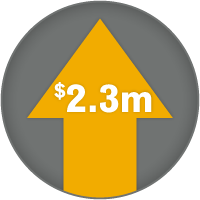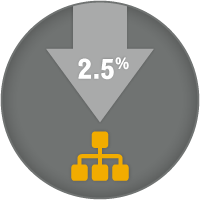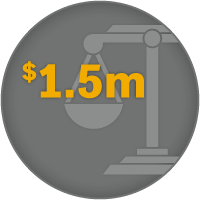March 28 update: The Budget Advisory Committee's final report is now available, which modifies the recommended tuition adjustments. Read more in this Dal News story.
Dalhousie’s Budget Advisory Committee (BAC) released its draft operating budget report for 2016-2017 on Thursday after spending the past few months meeting and consulting with Faculties, units, and students across the university community.
The draft report provides an overview of the anticipated revenues and expenditures for the upcoming year as well as recommendations for special allocations and changes to tuition, fees and Faculty/unit budgets to balance the overall operating budget.
Highlights of the report include:
- That the anticipated $2.3 million increase in funding from the province is not enough to cover the rising costs of running the university.
- Proposed tuition increases of 3% in all programs and to the international differential fee, as well as additional tuition adjustments (as allowed by the province) for undergraduates in Engineering (Halifax), Pharmacy, and on the Agricultural Campus.
- A recommended 2.5% reduction to all Faculty/unit budgets.
- The need to increase funding to facilities renewal and add new funding for network infrastructure requirements and Faculty of Arts and Social Sciences initiatives.
Releasing the draft plan now gives stakeholders across Dalhousie — from faculty and staff to students — the chance to provide additional input on the recommendations before the BAC sends its final report to the president and the Board of Governors for discussion. The Board approves tuition and fees in April (ensuring changes are implemented ahead of the upcoming academic year) and the final operating budget in June.
As we have done in past years, we’ve prepared a Dal News “BACgrounder” that looks into the BAC process, the report’s recommendations and their impact in the Dalhousie community. If you’d like to be part of the consultation process, check out the full details at the bottom of this story.
Read: Balanced approach to proposed Dalhousie budget includes tuition adjustments
Read: The Budget Adivsory Committe Draft Operating Budget Plan, 2016-2017 [PDF]
Read: Student tuition and fee recommendations, 2016-2017 [PDF]
Who is the Budget Advisory Committee (BAC)?
Chaired by the provost, the BAC’s members include the vice-president finance and administration, faculty, administrators and students. Members are asked to participate based on their knowledge and expertise.
The BAC advises the president on the university’s operating budget and drafts the official budget plan each year. The committee commenced consultation and deliberations on the budget in September, and through the fall solicited input from Faculty deans, unit managers and student groups before beginning work on the draft budget report that was released today. Consultations will now continue with the Dal community for further feedback on the BAC report’s recommendations.
This year, for the first time, the Agricultural Campus budget is included in the BAC process.
The budget must be balanced

Dalhousie’s Board of Governors requires a balanced operating budget. That means the budget plan must address any gaps that exist between the university’s projected revenue (money coming in) and projected expenditures (money being spent).
Government funding

Nearly 90% of Dal’s operating funds come from just two sources: government funding and tuition revenue. The larger of the two is the government grants, which fund more than half of the university’s total operating budget.
Dal is expected to see a modest increase in funding from the province of $2.3 million this year. Unfortunately, this is not nearly enough to cover the increased costs of running the university and supporting targeted investments next year.
Dal’s rising expenditures and strategic investments
 Dal's operating expenditures are expected to increase by $12.4 million in 2016-2017. Most of these projected cost increases are in compensation for faculty and staff ($10.1 million), which makes up about 78% of the university’s operating budget. Each year, faculty and staff across all employee groups receive cost of living increases and progression increases as outlined in Dal’s collective agreements.
Dal's operating expenditures are expected to increase by $12.4 million in 2016-2017. Most of these projected cost increases are in compensation for faculty and staff ($10.1 million), which makes up about 78% of the university’s operating budget. Each year, faculty and staff across all employee groups receive cost of living increases and progression increases as outlined in Dal’s collective agreements.
Other projected cost increases include inflationary adjustments in non-salary budgets, increased utilities cost, and an inflationary increase in the library acquisitions budget.
There are also four targeted investments in the 2016-2017 budget plan for specific university priorities:
- $1.0 million increase to the Facilities Renewal Budget to continue improving Dal’s building infrastructure, which ranks as the second-poorest among Canada’s leading U15 research universities.
- Additional $700,000 in funds to support Strategic Direction initiatives
- $500,000 for current and future Information Technology infrastructure requirements, necessary to address escalating network capacity issues on campus.
- $500,000 to support the Faculty of Arts and Social Sciences in developing strategies to improve its financial sustainability in light of declining enrolment.
Together these increased costs total $15.1 million. Take out the $2.3 million in new provincial funding, and the Dalhousie budget has a gap of $12.8 million it needs to close, primarily with tuition and budget cuts.
Tuition adjustments

There are two ways Dalhousie can generate more tuition income: recruiting more students and raising fees. Given regional and national demographic trends, among other factors, the BAC is predicting Dalhousie’s enrolment will be roughly the same in 2016-17 as it is this current year.
So increasing tuition revenue then requires raising fees. The Province of Nova Scotia has capped tuition increases for most programs at 3% in recent years, and the BAC is recommending that a 3% increase be applied across all programs next year. That will add an additional $4.7 million to the budget. There would be no additional increases beyond the 3% to the international differential fee.
In April last year, the provincial government announced that universities could also implement a one-time adjustment to tuition fees outside of the 3%, with the goal of allowing schools to better align their fees with similar programs at other universities. After reviewing Dal’s programs based on these criteria, the BAC is recommending tuition adjustments only for undergraduates in Engineering (Halifax), Pharmacy, and Agriculture. These adjustments, which are in addition to the 3% general increase, would be phased in over the maximum three-year timeframe allowed by the province (through 2018-2019) to lessen the impact on current students.
Editor's note: The recommendations below have been modified in the March 28 BAC Final Operating Budget Plan. Read more on Dal News.
The BAC is proposing a 5% adjustment in the fee for individual undergraduate courses taught by the Faculty of Engineering and School of Pharmacy and a 6.3% adjustment for all undergraduate courses taught on the Agricultural Campus in each of the next three years. Given that students in Engineering (Halifax) and Pharmacy take many courses outside their main departments that are not subject to this increase, the average tuition increase per year for those individuals will be less than 5%.
For a student entering these programs this fall, the adjustment would increase average tuition over the duration of their studies by 10.5% for Engineering students, by 10.9% for Pharmacy students and by 14.9% for students on the Agricultural Campus. Based on current enrolment in the three areas, these additional tuition adjustments would impact approximately 15% of Dal students. Learn more about each adjustment: Agriculture, Engineering, Pharmacy.
These additional tuition changes will add another $800,000 to the university’s 2016-2017 budget.
Taken together, the 3% general increase ($4.7 million) and the additional tuition adjustments ($800,000) would add $5.5 million to the university’s 2016-2017 budget.
The BAC is also recommending a 3% increase in the student auxiliary fee (from $84.35 to $86.90 per term), which will add an additional $91,000 to the Facilities Renewal budget.
Finding cost savings in Faculties and service units

In addition to proposed tuition and fee adjustments, the BAC is once again recommending a reduction to all Faculty and service unit budgets as part of balancing Dal’s books. The BAC doesn’t make recommendations for how these costs are saved; it’s up to individual Faculty or service units to decide on how to implement budget reductions based on their own priorities and goals.
The BAC’s recommendation is for a 2.5% decrease to all Faculty/unit budgets next year. Even with this cut, Faculty/units will still see a total overall increase of $4.3 million in funding to support increases in compensation costs.
What about reserve funds?

Dalhousie does have reserve funds on-hand (currently, $8 million) — money generated in years when enrolment was larger than forecasted. These funds are intended to be used primarily as a risk-management tool. For example, if Dalhousie’s enrolment next year were to come in lower than forecast, reserve funds would be used to keep the budget balanced and avoid mid-year budget cuts in faculties and programs.
In recent years, the university has dipped into reserve funds to help balance the budget, and the BAC recommends doing so again for 2016-17, using $1.5 million.
Why not use more of this fund? The problem is that relying on one-time funding is only a stop-gap measure. The budget constraints Dalhousie faces (rising costs, limited government funding) aren’t solved when one-time funding is used, and once the funds are depleted they’re not available for use to balance the budget. That’s why the BAC recommends the university continue to scale back reliance on reserve funds to balance the budget. (The 2016-17 budget plan would use $300,000 less in reserve funds than last year’s budget.)
We want to hear from you

The BAC welcomes the thoughts of Dal faculty, students and staff before it submits its final recommendations to the president and the Board of Governors in April. Here’s how you can weigh in:
If you’d like to provide written feedback and input, email BAC@dal.ca
There are four information/consultation sessions for students to provide feedback on the draft Budget Advisory Committee report and the proposed fees for 2016-17. Details below.
Budget Sessions
Tuesday, February 23 (Note: new location)
Time: 4:00-5:00 pm
Location: Truro Campus, Cox Institute, 21 Cox Road, Cox Room 24
Part 1: General Budget Session
Part 2: Agriculture Tuition Session
Thursday, February 25
Time: 12:30-1:30 pm
Location: Burbidge Building, Room 109, 5968 College Street
Part 1: General Budget Session
Part 2: Pharmacy Tuition Session
Monday, February 29 (Note: new date, time, location)
Time: 5:30-6:30 pm
Location: Sexton Campus, Room B 225, B Building, 1360 Barrington Street (enter off Barrington St main entrance, elevator to 2nd floor)
Part 1: General Budget Session
Part 2: Engineering Tuition Session
Wednesday, March 2 (Note: new date/time/location)
Time: 4:00-5:00 pm
Location: McInnes Room, Student Union Building. Students can attend in person, or watch a live stream at www.dsu.ca or on the DSU YouTube Channel.
General Budget Session
[Please note: The 'Tuition adjustments' section of this article has been updated to reflect clarifications to details in the Budget Advisory Committee's 2016-2017 Draft Operating Budget Plan about proposed tuition increases to Dalhousie's Engineering and Pharmacy programs.]


